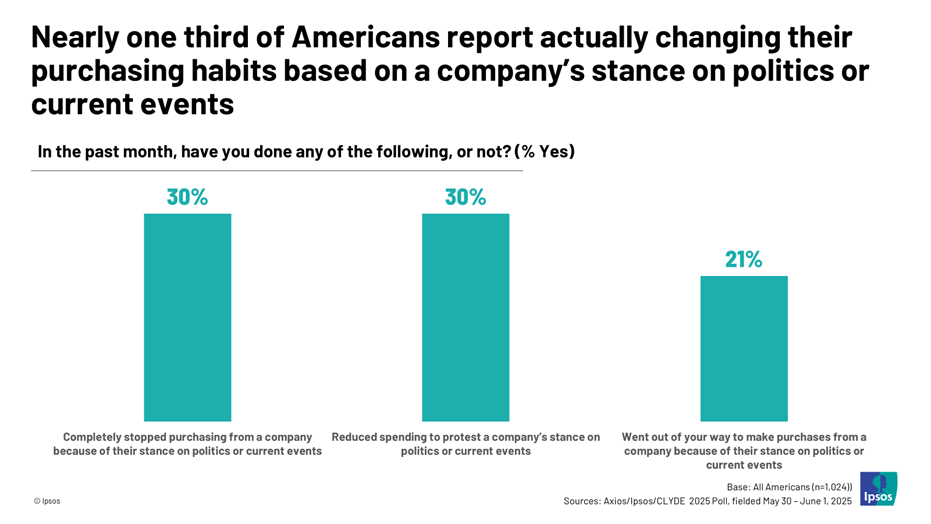Nearly one in three Americans have stopped purchasing from a company due to politics
Topline Findings
Washington, DC, June 16, 2025 – Nearly half of Americans believe it is inappropriate for companies to comment publicly on political or social issues, and a slim majority indicate they would be likely to stop purchasing from a brand if they disagreed with their stance on an issue, according to a new Axios/Ipsos/CLYDE survey. However, most also believe companies have a responsibility to speak out on issues that may impact their employees. Moreover, the specific type of issue matters for many people on determining what is inappropriate or not. Finally, though over half say they are likely to change their purchasing behavior, far fewer – just under one in three – actually report doing so.
Detailed Findings
1. A plurality of Americans finds it inappropriate for companies to comment publicly on political or social issues. However, nearly three in five believe that companies have a responsibility to speak out on issues that may impact their employees.
- Nearly half believe that it is inappropriate for companies to publicly comment on political or social issues (47%), compared to 20% who say it is appropriate, and 32% who say it is neither appropriate nor inappropriate.
- There is a significant partisan difference, as 65% of Republicans feel it is inappropriate for companies to publicly comment on political or social issues, compared to 30% of Democrats. Half (52%) of independents feel this way.
- Similar differences exist by age. Americans ages 18-34 are less likely to feel it is inappropriate for companies to comment publicly (33%) than those 35-49 (45%) and 50+ (56%).
- At the same time, however, 58% agree that companies have a responsibility to speak out on issues that may impact their employees. Half (49%) feel the same about an issue that may impact their customers.
2. When it comes to whether or not it’s appropriate for companies to speak out, the specific issue matters to most Americans.
- More than half of Americans think that the specific issue matters when determining whether is it appropriate for a company to speak out or not (55%), including about one in three who say the specific issue matters a lot (32%).
- However, speaking out about a specific issue may not necessarily increase trust in that company. When given a list of issues and asked if public comments on each specific topic would impact their trust in a company, most say it makes no difference or they are unsure.
- For roughly one quarter of Americans, when a company speaks out on economic issues or trade policy, it increases their trust in the company, compared to 18% who say it decreases trust.
- A plurality, 45%, agree that if a company takes a stand on an issue, they should stick by their decision, even if it makes consumers angry, compared to 14% who disagree and 39% who say neither.
3. While a majority of Americans report that they would avoid buying from a company if it supports an issue they do not agree with, fewer than a third report actually changing their purchasing habits based on a company’s stance on politics or current events.
- A slim majority agree that if a company takes a stand on an issue that they do not agree with, they are less likely to buy their products or use their services (53%). Thirteen percent disagree and 32% say neither.
- There is agreement along partisan lines: 58% of Republicans, 60% of Democrats, and 50% of independents say they would be less likely to purchase from a brand in this scenario.
- However, in the past month, fewer than one in three either stopped purchasing (30%) or reduced spending (30%) because of a company’s stance on politics or current events.
- Twenty-one percent say they have gone out of their way to make purchases from a company because of their stance on politics or current events.
- There are income differences on purchasing habits, with those who have a household income of under $50,000 being significantly less likely to change their purchasing behavior over politics or current events.
- There are also partisan differences. Democrats are more likely to have completely stopped purchasing (40%) or reduced their spending (42%) from a company than Republicans (24% each) and independents (29% and 28%, respectively).

About the Study
This Axios/CLYDE poll was conducted from May 30 to June 1, 2025, using the probability-based KnowledgePanel®. This poll is based on a nationally representative probability sample of 1,024 adults age 18 or older. The sample includes 267 Republicans, 334 Democrats, and 310 independents.
The survey was conducted using KnowledgePanel, the largest and most well-established online probability-based panel that is representative of the adult U.S. population. Our recruitment process employs a scientifically developed addressed-based sampling methodology using the latest Delivery Sequence File of the USPS – a database with full coverage of all delivery points in the U.S. Households invited to join the panel are randomly selected from all available households in the U.S. Persons in the sampled households are invited to join and participate in the panel. Those selected who do not already have internet access are provided a tablet and internet connection at no cost to the panel member. Those who join the panel and who are selected to participate in a survey are sent a unique password-protected log-in used to complete surveys online. As a result of our recruitment and sampling methodologies, samples from KnowledgePanel cover all households regardless of their phone or internet status and findings can be reported with a margin of sampling error and projected to the general population.
The data for the total sample were weighted to adjust for gender by age, race/ethnicity, education, Census region, metropolitan status, and household income. Party ID benchmarks are from the 2024 National Public Opinion Reference Survey (NPORS). The demographic benchmarks came from the 2024 March Supplement of the Current Population Survey (CPS).
- Gender (Male, Female) by Age (18–29, 30–44, 45-59 and 60+)
- Race/Hispanic Ethnicity (White Non-Hispanic, Black Non-Hispanic, Other, Non-Hispanic, Hispanic, 2+ Races, Non-Hispanic)
- Education (Less than High School, High School, Some College, Bachelor or higher)
- Census Region (Northeast, Midwest, South, West)
- Metropolitan status (Metro, non-Metro)
- Household Income (Under $25,000, $25,000-$49,999, $50,000-$74,999, $75,000-$99,999, $100,000-$149,999, $150,000+)
- Party ID (Republican, Leans Republican, Independent/Other, Democrat, Leans Democrat)
The margin of sampling error is plus or minus 3.3 percentage points at the 95% confidence level, for results based on the entire sample of adults. The margin of sampling error takes into account the design effect, which was 1.15. For Republicans, the margin of sampling error is plus or minus 6.2 percentage points, and the design effect is 1.08. For Democrats, the margin of sampling error is plus or minus 5.6 percentage points, and the design effect is 1.08. For independents, the margin of sampling error is plus or minus 6.1 percentage points, and the design effect is 1.22.
The margin of sampling error is higher and varies for results based on sub-samples. In our reporting of the findings, percentage points are rounded off to the nearest whole number. As a result, percentages in a given table column may total slightly higher or lower than 100%. In questions that permit multiple responses, columns may total substantially more than 100%, depending on the number of different responses offered by each respondent.
For more information on this news release, please contact:
Mallory Newall
Vice President
+1 416 572-5143
[email protected]
About Ipsos
Ipsos is one of the largest market research and polling companies globally, operating in 90 markets and employing nearly 20,000 people.
Our passionately curious research professionals, analysts and scientists have built unique multi-specialist capabilities that provide true understanding and powerful insights into the actions, opinions and motivations of citizens, consumers, patients, customers or employees. Our 75 business solutions are based on primary data from our surveys, social media monitoring, and qualitative or observational techniques.
“Game Changers” – our tagline – summarizes our ambition to help our 5,000 clients navigate with confidence our rapidly changing world.
Founded in France in 1975, Ipsos has been listed on the Euronext Paris since July 1, 1999. The company is part of the SBF 120, Mid-60 indices, and is eligible for the Deferred Settlement Service (SRD).
ISIN code FR0000073298, Reuters ISOS.PA, Bloomberg IPS:FP
35 rue du Val de Marne
75 628 Paris, Cedex 13 France
Tel. +33 1 41 98 90 00



